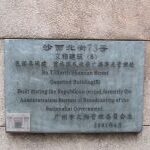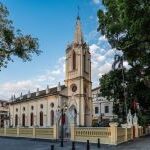I meant to share with you an epigram about the difference between the new and old Chinas. The University we visited yesterday, Sun Yat-sen, has a school of business named the “Whampoa Military Academy of Business.” That is the new (post 1985) China. The “Whampoa Military Academy” of old  China (and the Chinese used to make a sharp distinction between “before liberation” [1949] and “after liberation,”) was a military institute here in Guangzhou that played a prominent role in training leaders of modern China — including Chairman Mao and Chiang Kai-shek, opponents for most of the period from 1927 until their deaths in the 1970s.
China (and the Chinese used to make a sharp distinction between “before liberation” [1949] and “after liberation,”) was a military institute here in Guangzhou that played a prominent role in training leaders of modern China — including Chairman Mao and Chiang Kai-shek, opponents for most of the period from 1927 until their deaths in the 1970s.
The business metaphor is apt in other ways for the “new” China, and an example is provided by our site visit today: to the world’s largest producer of microwave ovens, which produces domestically under the brand Midea, and internationally as a contractor for Walmart (they had interesting stories about Walmart’s conditions; apparently Walmart inspectors come twice a year, unannounced and investigate everything in terms of social conditions of workers — checking data and interviewing people randomly), Sears, and other retailers. The company started as the dream of a local entrepreneur (the Cantonese have long been in the vanguard of entrepreneurship in China) who in 1968 parlayed 5,000 Renminbi into a factory making bottle tops.
Today, Midea is China’s 61st largest company, with 100,000 employees. Its goal (typical of almost every business we’ve visited) is to build an international brand renowned for quality. (When my roommate, Jim Gerber from San Diego State, picked up the newspaper this morning, he said, “I wonder what the Chinese are claiming #1 now”). The route it is choosing, however, provides quite a contrast with China’s business strategy in the past — it wants to be the leader in innovation, and has brought research helpers from Korea and Japan to move up the value chain. Among other items, Midea has developed a microwave steamer; if you know anything about Chinese cooking, you’ll understand what a valuable addition that is. The tour leaders also showed us a portable microwave, explaining that it can be used camping! That will certainly change the one-pot meal!
One of Midea’s main challenges is labor, ironically enough; the locals don’t want to work for as little money as the factory workers earn, so it is mostly people from the interior provinces who come to work here. The plant shuts down for two weeks, (I think that’s it) for the New Year, and the human resource director was a little worried about the number who would return. The official figures in the paper indicated that employment declined 6% last year, but this company benefited from the recession because retailers worried that some of the smaller suppliers would go bankrupt dropped them in favor of Midea, and the small suppliers did go bankrupt.
One irony for me is that the Chinese characters the company uses are phonetically the same as my cultural revolution Chinese — for American imperialism! — but not the same characters.
On the way back to the hotel we traveled to one of the districts in the city of Foshan, which had a huge building for obtaining government permits to start a business. The tour leader said, “It’s like Tiananmen Square,” but it bore no resemblance to a 1950s collection of Soviet style buildings, which is what surrounds the Gate of Heavenly Peace in Beijing. Instead, this particular building (which houses all the bureaus involved in obtaining the permit — reducing the time to about 4 weeks from 6 months) looks more like a performance hall, while the city government looks like a skyscraper in a major city designed by a major architect. The square is a well-appointed and landscaped area. This is not the old China. And to think, when I came to Guangzhou 20 years ago, we were taken to Foshan because it was world-famous for pottery — and our hosts wanted to show off the then only expressway in China — nine miles from Guangzhou to Foshan.
Even the area that we are in — Shamian Island, the old foreign concession area — shows marks of China’s ability to absorb its recent past. While my recollection is that there’s a park on the island that had a gun and an explanation about the Opium War, I couldn’t find it this afternoon. And 
 about 9 years ago, the local government began putting plaques on the buildings indicating their former usage; the restaurant we ate in a few days ago, for example, was “gazetted” as the former home of the Butterfield and Swire Company, one of the famous hongs that dominated British trade in the East.
about 9 years ago, the local government began putting plaques on the buildings indicating their former usage; the restaurant we ate in a few days ago, for example, was “gazetted” as the former home of the Butterfield and Swire Company, one of the famous hongs that dominated British trade in the East.
Tomorrow, we’re taking the bus to Hong Kong, and we’re supposed to be stopping at a Walmart; we’ll certainly be seeing more of the Pearl River Delta miracle, which is where socialism with Chinese characteristics began.
One can only imagine what the Marx/Lenin/Stalinist would have to say about the new China.